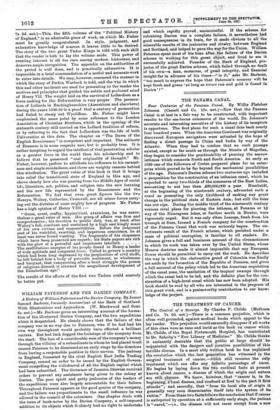TIIE PANAMA CANAL,
Pour Centuries of the Panama Canal. By Willis Fletcher Johnson. (Cassell and Co. 12s. net.)—Now that the Panama Canal is at last in a fair way to be constructed, with important results to the sea-borne commerce of the world. Dr. Johnson's accurate and interesting narrative of the history of its inception is opportune. The first plans for such a canal date back nearly four hundred years. When the American Continent was originally discovered European navigators were actuated by the hope of finding n direct passage to China and India by way of the Atlantic. When they had to confess that no such passage existed, except so far south as through the Straits of Magellan, they began to consider the practicability of piercing the narrow isthmus which connects North and South America. As early as 1529 One of the followers of Cortes prepared plans for an enter- prise which proved to be far beyond the mechanical possibilities of the age. Paterson's Darien scheme two centuries ago included a proposition for the construction of an isthmian canal, which be expected to carry two-thirds of the commerce of the East Indies, amounting to not less than £30,000,000 a year. Humboldt, at the beginning of the nineteenth century, advocated such, a canal as presenting the only likelihood of making, any great change in the political state of Eastern Asia; but still the time was not ripe. During the middle third of the nineteenth century various rival plans for piercing the isthmus, at Panama or bY way of the Nicaraguan lakes, or further north in Mexico, were vigorously urged. But it was only When Lesseps, fresh from his triumph at Suez, formed a French company for the construction of the Panama Canal that work was seriously begun. The un- fortunate result of the French scheme, which perished under: a mass of political corruption, is familiar to all readers. Dr. Johnson gives a full and luminous account of the circumstances in which its work was taken over by the: United States, whose Monroe doctrine made it almost impossible that any European Power should be permitted to carry out the work. He describes the way in which the obstructive greed of Colombia was finally set aside by the formation of the Republic of Panama, and gives a full account of the policy which led to the American acquisition of the canal zone, the sanitation of the tropical swamps through which the canal had to be led, and the definite plan for the Con- struction of a high-level canal which has now been adopted.' 'His book should be read by all who are interested in the progress of this great work, and is a praiseworthy centribution to our know- ledge of the project.
















































 Previous page
Previous page